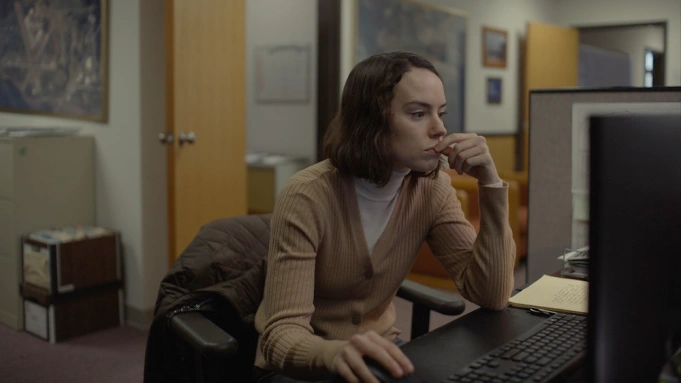
Rachel Lambert’s Sometimes I Think About Dying is for depressed introverts. It’s for those who like being alone but are also incredibly lonely. It’s a complicated dilemma that is difficult to put into words, but the film captures it for us. Once a short film, the script does feel like it’s trying too hard to extend itself but also delivers a sweet and humorous story about finding a connection in a world that feels so disconnected.
Dabney Morris’s classically toned score welcomes the viewer into a small seaside town. Dustin Lane shoots it beautifully, evoking tranquillity with a touch of bleakness. Where you live will always seem dreary when you’re wasting sunny days away in an office, like the film’s protagonist Fran (Daisy Ridley). She leads a mundane existence. She wakes up, goes to work, stares at Excel sheets and emails, comes home, heats up a flavorless meal, does sudoku, and goes to bed. Repeat. Mouse clicks and clacking of keys work as the opening and end to a corporate song, with the buzzing of coworkers as the chorus. Everyone around her talks without ever saying anything of significance, and she would rather daydream to pass the time.
The framing and writing of scenes at the office really hammer how much more isolated one can feel when surrounded by a group of people. While her coworkers gather together in the break room, Fran stands in the doorway. She’s always at a distance, but also desperate for conversation despite not knowing how to carry it. However, when she receives a Slack message from the new guy, Robert (Dave Merheje), her bubble of loneliness suddenly bursts. Forcing her to come out of the residence she’s made inside her mind, she’s faced with the anxiety-inducing idea of actually having to hang out with someone.
When they do, Robert asks her about herself; what she likes and dislikes. She seems unsure of how to respond. No one has ever cared to ask, but her answers are very brief. She doesn’t think she’s interesting enough to open up to him. Slowly but surely, though, we see her do just that. She starts to answer his questions more candidly and without hesitation as she grows more comfortable with Robert.
She’s finally being truly seen by someone, but navigating this new relationship isn’t easy. The film has a scene where Fran lies on the floor of her apartment in the path of the sun shining through her window. The warmth she feels on her back at this moment is what she wants to feel with another person, but her walls are almost impenetrable. It causes tension between her and Robert, and you’re unsure if it will actually work between them.
The film’s screenwriters (Stefanie Abel Horowitz, Kevin Armento, and Katy Wright-Mead) have crafted a compelling character study. And despite the subject matter at hand, Fran is refreshingly written in a way that doesn’t evoke pity. She’s instantly relatable and a character you fall in love with as the film goes on. The film’s imagery allows you to go into the recesses of her imagination, and seeing what she daydreams about allows for a deeper understanding of her character. She’s quiet, Ridley speaking in almost a whisper, but she doesn’t need to say or share much for us to understand what kind of person she is.
Images of her laying dead on the beach or on the forest floor make the audience understand her desire to escape from her life. Whether permanently or not, the suffocation she feels under the weight of loneliness is impactfully rendered in Ridley’s performance. Having little dialogue, she captures a heaviness in Fran’s silence. With Fran’s lack of social skills, there are moments where something she says is absolutely hilarious, honing in on the comedy bit of this dramedy. Ridley captures a likability and a sweetness that comes out underneath all of Fran’s anxiety, fear, and dread. It’s an emotional performance that sticks with you.
The richness of life can escape your grasp when existing in banality, and Fran’s story will hurt in its relatability for those depressed, lonely, and drained by mundanity. We all desire connection, but like Fran, many struggle to find it in a world that’s supposed to be more connected than ever. It’s difficult to not want to escape into our own little world, but Sometimes I Think About Dying is all about taking risks, challenging yourself to break out of your comfort zone, and watching the magic happen.



